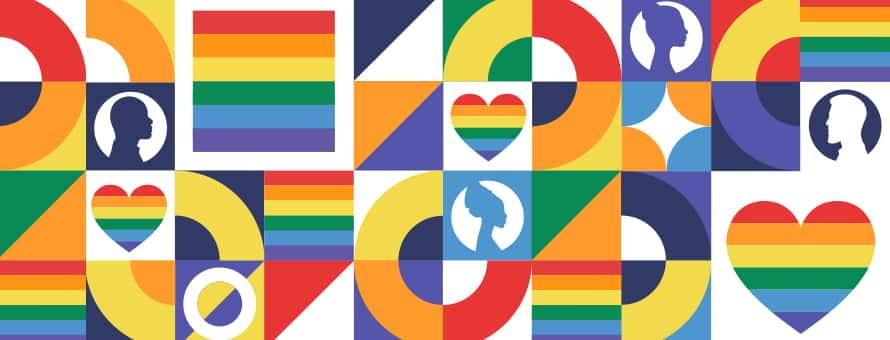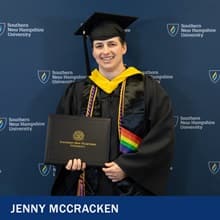Celebrating Pride: Reflections from the 2SLGBTQIA+ Community at SNHU

For 2SLGBTQIA+ people around the world, Pride Month is a time of celebration. An opportunity to live out loud, and — as the drag icon RuPaul once famously said — “use all the colors in the crayon box.”
Pride is more than that, too. Behind every packed parade, rainbow flag and tea dance is a deeper history: one of resilience, resistance and the bravery to exist just as you are.
 “Pride started because our community said ‘no more,’” said Jasmine Liu (she/her/hers), internal program manager in the Office of Diversity, Equity & Inclusion at Southern New Hampshire University (SNHU). “They said ‘no, you’ll not vilify us, murder us, trash our establishments, ignore our struggles and pain, raid any place that we find joy in. No more. We're not gonna do that anymore."
“Pride started because our community said ‘no more,’” said Jasmine Liu (she/her/hers), internal program manager in the Office of Diversity, Equity & Inclusion at Southern New Hampshire University (SNHU). “They said ‘no, you’ll not vilify us, murder us, trash our establishments, ignore our struggles and pain, raid any place that we find joy in. No more. We're not gonna do that anymore."
It was this defiance that fueled the 1969 Stonewall Uprising — a series of protests in response to a police raid at the Stonewall Inn in Greenwich Village, NYC. Reportedly sparked by the actions of queer people like Marsha P. Johnson and Stormé DeLarverie, it is largely viewed as the catalyst of the LGBTQ+ civil rights movement.
Yet, while pivotal — it's important to note that this was not an isolated incident. Far from it. Trace back, and you'll find a movement generations in the making.
The His-and Her-story of Gay Rights
 “What I want people to know about our history: it's rich. There's a healthy tapestry of folks in the 2SLGBTQIA+ space,” said Torian Parker-McNeil (he/him/his), an SNHU instructional designer. “We are here and whether people are known or unknown, we need to keep those stories alive because they help us navigate the future.”
“What I want people to know about our history: it's rich. There's a healthy tapestry of folks in the 2SLGBTQIA+ space,” said Torian Parker-McNeil (he/him/his), an SNHU instructional designer. “We are here and whether people are known or unknown, we need to keep those stories alive because they help us navigate the future.”
Back in 1888 — nearly a century before Stonewall — William Dorsey Swann became the first-ever known American activist to lead a queer resistance group, according to a PBS special. A formerly enslaved person and self-proclaimed “Queen of Drag,” Swann was arrested and detained for hosting ‘drag balls’ in Washington, D.C. at a time when queer joy, especially for people of color, was widely feared.
These drag balls included singing, dancing and a competition called a “cakewalk” — where cornmeal pancakes (or ‘hoecakes,’) were awarded to the best dancers. The guests, many of whom were formerly enslaved men adorned in silk and satin dresses, reveled in these spaces to retreat from a culture and society that oppressed them.
Beyond Swann’s drag balls, some of the most notable recorded instances of civil resistance amongst queer people didn’t occur till the 1950s. This coincided with a period called the Lavender Scare — a moral panic spearheaded by Joseph McCarthy which led to the mass dismissal of gay men and lesbians from state employment, according to a National Archives Foundation newsletter.
One notable civil rights leader at this time was Frank Kameny, a Harvard-educated astronomer who was fired from his position with the U.S. Army Map Service in 1957 because he was gay. This ultimately led to his co-founding of the Mattachine Society of Washington, D.C., one of the earliest LGBTQ+ rights organizations in the United States.
A New Era of Pride
On June 28, 1970 — exactly one year after Stonewall — the first Pride Marches were held in New York City, Los Angeles and Chicago. In bringing the community out of the shadows and into the streets, a new movement was underway.
By 1971, Pride had extended its reach globally, with marches in Boston, Dallas, Milwaukee, London, Paris, West Berlin and Stockholm. By 1972 the participating cities included Atlanta, Brighton, Buffalo, Detroit, Washington D.C., Miami and Philadelphia, as well as San Francisco.
Over the next few decades, Pride helped sustain a legacy of queer political action. Along with grassroots organizations like the Gay Liberation Front (GLF) and the AIDS Coalition to Unleash Power (ACT UP), Pride events helped connect queer people and allies alike in the fight for basic human rights.
 “Pride is a chance to celebrate who we are as people within the 2SLGBTQIA+ community and the adversity that we've overcome,” said Helena Iaquinta (she/her/hers), a UX researcher in the diversity, equity and inclusion (DEI) space at SNHU. “I think of it as a time to remind ourselves what we're still fighting for, which is equity, equality and acceptance, and to get the energy to keep going.”
“Pride is a chance to celebrate who we are as people within the 2SLGBTQIA+ community and the adversity that we've overcome,” said Helena Iaquinta (she/her/hers), a UX researcher in the diversity, equity and inclusion (DEI) space at SNHU. “I think of it as a time to remind ourselves what we're still fighting for, which is equity, equality and acceptance, and to get the energy to keep going.”
Over time, Pride’s political roots, while still present, evolved into a much more colorful and celebratory tone.
This was in large part due to the creation of the rainbow flags we now see decorating storefronts and lining the streets every Pride season. Designed in the late 1970s by Gilbert Baker and Lynn Segerblom (aka Faerie Argyle Rainbow), these icons were originally requested by Harvey Milk — the first openly gay man ever elected to public office. He wanted a powerful, memorable symbol to represent the community, and the rest, as they say, is history.
Pride Today
In the last decade, the 2SLGBTQIA+ community has made great strides toward acceptance. The landmark decision to legalize gay marriage in 2015, for example, was a powerful culmination of decades-long activism and visibility. But in more recent years, many feel the basic rights they’ve worked so hard to achieve are under attack.
“There's legislation happening all over the country that is limiting care for our community, restricting access to public spaces, and keeping us separate and not equal,” Iaquinta said.
In 2023 alone, over 75 anti-LGBTQ+ policies were signed into law, according to the Human Rights Campaign (HRC). As a result — for the first time ever in the organization’s 40+ year history — HRC declared a National State of Emergency for LGBTQ+ Americans.
Many of these new laws specifically threaten to dial back the rights of trans and gender-nonconforming people. In 2023, the Tennessee Adult Entertainment Act, also known as the anti-drag bill, was signed into law, effectively banning performances of "male or female impersonators" in public or in front of children in the state of Tennessee. The act came under fire not only for limiting the presence of drag in these communities, but also for using vague language that could be used to criminalize the mere existence of trans individuals in public spaces.

For recent SNHU graduate Jenny McCracken '24 (she/her/hers), laws like this feel like history repeating itself.
“I served under ‘Don’t Ask, Don’t Tell' for many years, where I constantly feared prosecution under military law for simply being gay," she said. "My girlfriend and I even had a fake second bedroom setup in case people came over to our house so we could maintain that we were roommates."
In living through these hardships, McCracken reflected on how massive every step forward felt.
"The fear of being out followed me for many years," she said. "I can recall waiting to hear the results of the ballot on gay marriage in my state and celebrating when it passed."

For married couple Mars Girolimon (he/they/them), and Becca (Betty) James (she/her/hers), both employees at SNHU, celebration comes in the form of connection. Not just to each other, but to their communities as well.
"It feels important now, more than ever, to come together and to unify our voices," said James, an academic advisor.
 While both express gratitude to feel "accepted" and "open" at work, they recognize that, for many others under the 2SLGBTQIA+ umbrella, this is not the norm.
While both express gratitude to feel "accepted" and "open" at work, they recognize that, for many others under the 2SLGBTQIA+ umbrella, this is not the norm.
"We've come a long way, but we still have a long way to go,” said Girolimon, an associate content writer.
This is especially true for queer youth.
 “It's so critical to make people feel as though they have a space to exist as who they are,” said Scott Cloutier (he/him/his), an SNHU senior marketing solution architect. “Last year we lost a high schooler (Nova Dunn) in Manchester (New Hampshire) because of some of the things that were happening around the queer community and the anti-LGBTQIA+ laws that are going into place.”
“It's so critical to make people feel as though they have a space to exist as who they are,” said Scott Cloutier (he/him/his), an SNHU senior marketing solution architect. “Last year we lost a high schooler (Nova Dunn) in Manchester (New Hampshire) because of some of the things that were happening around the queer community and the anti-LGBTQIA+ laws that are going into place.”
In 2024, the nation’s leading suicide prevention organization for LGBTQ+ youth, The Trevor Project, released survey results of queer young people ages 13 to 24. Of the 18,000 youth surveyed nationwide, 39% of LGBTQ+ people seriously considered attempting suicide in the past year. Those who are trans, nonbinary and/or people of color reported higher rates than their peers.
Keeping Up the Good Fight
In the face of backlash, the need for allyship is greater than ever.
“Pride isn’t just for the queer community. Pride is really a chance for allies to get out there and show their families, their kids, that the 2SLGBTQIA+ community is made up of real people," Iaquinta said. "Talented, unique, sparkly and beautiful people."
Beyond visibility, allies can help create safer spaces for their queer peers.
 “I think about the allies that show up for pride," said Matt Thornton (he/him/his), vice president of customer experience at SNHU. "And I think that's so important because, well, one, it's a way to educate yourself, right? About something that perhaps you don't understand or is a little unknown to you. It's also an opportunity to show the community that you stand with us.”
“I think about the allies that show up for pride," said Matt Thornton (he/him/his), vice president of customer experience at SNHU. "And I think that's so important because, well, one, it's a way to educate yourself, right? About something that perhaps you don't understand or is a little unknown to you. It's also an opportunity to show the community that you stand with us.”
Thornton is quick to point out that, in a world where safety is not a guarantee, no gesture of support is too small.
“I just cannot tell you what it means to walk into a new place and have that rainbow flag sticker on the door," he said. "It absolutely takes this weight off of my shoulders when I walk in with my family and I see that. Almost like this sigh of relief of, ‘I know I'm safe. I know I'm good here. If anything happens, the staff here have got my back.'"
Allyship also has the power to change hearts and minds.
“I think there is a certain social capital that our allies hold,” said Parker-McNeil. “And I think that's super important to just recognize.” Tapping into that social capital, Parker-McNeil notes, is crucial in creating systems that “everyone can benefit from.”
Allyship can even combat the voices that tell queer youth, 'you're not worthy of love.'
“I have yet to go to a Pride event and not cry when I see the 'Free Mom Hug' shirts because I know what so many queer folks have been through to get to where they are," said Iaquinta, herself a proud parent. "That there's someone there opening their arms with no judgment to love them… that to me is really what Pride is about,"
As many queer people can attest, the love of family — chosen or otherwise — is life-changing.
"Whenever I see kids go up to these moms, I lose it because I know how hard it is when their families disown them,” Iaquinta said.

Gaily Forward: A Path Toward a Brighter Future
When reflecting on Pride, it’s important to understand what it means for 2SLGBTQIA+ people today.
On one hand, in the face of dangerous legislation, there’s a fear of heading in the wrong direction. On the other, much like Swann’s early drag balls, there’s a defiant desire to celebrate queer joy — even in the face of oppression.
“I love seeing my queer friends and family exuding love, happiness and celebratory vibes,” Liu said. “It gives me hope. It keeps me going when I see these dangerous bills being introduced across the country and in my own backyard.”
This sense of love and hope is why people like Liu look forward to Pride season every year.
“I want to see all the Pride,” she said. “I want to see every picture of every moment of every flag of every outfit, family, whatever. Is this your first pride? Please share all the pictures and stories. Is this your 40th Pride? Please share pictures, stories, your wisdom, pass it all down."
This excitement extends not just to individuals — but to families, too.
"I want to see all those babies and their Pride onesies with their proud parents," Liu said. "We have to show that no matter what they throw at us, we still love. And find reasons to smile and still grow our families and live full lives because we all deserve to celebrate.”
And as for the rest of the year?
“We can just love and accept everybody for who they are,” Thornton said. “This is a long multi-generational fight and we need to do the right thing for all people. Just love each other. That's it. Just love each other. It's so simple.”
Spencer Hensel is a copy director at Southern New Hampshire University. He is passionate about helping people own their power, and has channeled this passion as a storyteller, manager, mentor, and EDI leader at work. A professional writer for over a decade, he’s had the pleasure of writing for Boston startups in the education, food and tech industries. He has volunteered as a TEDx speaker coach and organizer since 2022. Want to learn more? Connect with him on LinkedIn.
Explore more content like this article

Heart, Hope and Some Help Along the Way: SNHU’s Fall Class of 2025

Old Time Charm, Big Time Fun at SNHU’s Homecoming

‘What if We Go Back to School... Together?’
About Southern New Hampshire University

SNHU is a nonprofit, accredited university with a mission to make high-quality education more accessible and affordable for everyone.
Founded in 1932, and online since 1995, we’ve helped countless students reach their goals with flexible, career-focused programs. Our 300-acre campus in Manchester, NH is home to over 3,000 students, and we serve over 135,000 students online. Visit our about SNHU page to learn more about our mission, accreditations, leadership team, national recognitions and awards.


